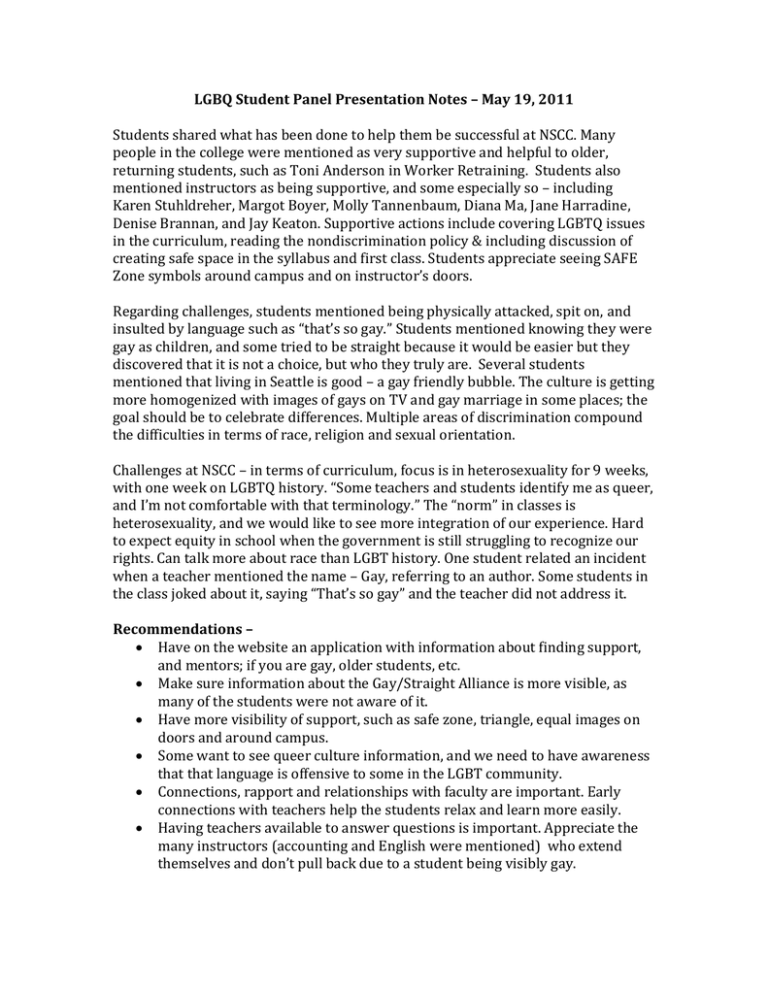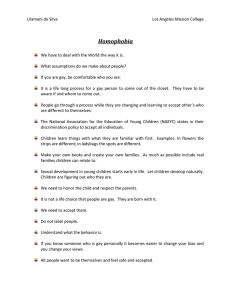LGBQ Student Panel Presentation Notes – May 19, 2011
advertisement

LGBQ Student Panel Presentation Notes – May 19, 2011 Students shared what has been done to help them be successful at NSCC. Many people in the college were mentioned as very supportive and helpful to older, returning students, such as Toni Anderson in Worker Retraining. Students also mentioned instructors as being supportive, and some especially so – including Karen Stuhldreher, Margot Boyer, Molly Tannenbaum, Diana Ma, Jane Harradine, Denise Brannan, and Jay Keaton. Supportive actions include covering LGBTQ issues in the curriculum, reading the nondiscrimination policy & including discussion of creating safe space in the syllabus and first class. Students appreciate seeing SAFE Zone symbols around campus and on instructor’s doors. Regarding challenges, students mentioned being physically attacked, spit on, and insulted by language such as “that’s so gay.” Students mentioned knowing they were gay as children, and some tried to be straight because it would be easier but they discovered that it is not a choice, but who they truly are. Several students mentioned that living in Seattle is good – a gay friendly bubble. The culture is getting more homogenized with images of gays on TV and gay marriage in some places; the goal should be to celebrate differences. Multiple areas of discrimination compound the difficulties in terms of race, religion and sexual orientation. Challenges at NSCC – in terms of curriculum, focus is in heterosexuality for 9 weeks, with one week on LGBTQ history. “Some teachers and students identify me as queer, and I’m not comfortable with that terminology.” The “norm” in classes is heterosexuality, and we would like to see more integration of our experience. Hard to expect equity in school when the government is still struggling to recognize our rights. Can talk more about race than LGBT history. One student related an incident when a teacher mentioned the name – Gay, referring to an author. Some students in the class joked about it, saying “That’s so gay” and the teacher did not address it. Recommendations – Have on the website an application with information about finding support, and mentors; if you are gay, older students, etc. Make sure information about the Gay/Straight Alliance is more visible, as many of the students were not aware of it. Have more visibility of support, such as safe zone, triangle, equal images on doors and around campus. Some want to see queer culture information, and we need to have awareness that that language is offensive to some in the LGBT community. Connections, rapport and relationships with faculty are important. Early connections with teachers help the students relax and learn more easily. Having teachers available to answer questions is important. Appreciate the many instructors (accounting and English were mentioned) who extend themselves and don’t pull back due to a student being visibly gay. Look for and add curriculum experts who are not white, straight males, since these are the primary sources we see. Instructors can include nondiscrimination statements and safe communication expectations in their first classes and syllabi. Have conversations about use of respectful language and that put-downs are off limits, such as saying “That’s so gay.” LGBTQ people spend much time protecting themselves in “normal” society. Anything we can do to help create safe, respectful space is great – as that allows the student to be less stressed and more able to learn. Teachers lead by example. When the teacher enjoys teaching and models respect for students, students enjoy the class and learn more. Counselors are great. Students mentioned difficulty accessing their support sometimes, as they had trouble getting past the desk to their area, even when a student was in emotional crisis. Some students have gotten the message that the counselors can only discuss academic issues, and sometimes there is a need for emotional support. Peer mentoring would be great to have. Would be great to have more money and leadership to keep LGBT visible on campus, such as Ally week, Coming Out Day, Pride Day. Have a NO Tolerance zone for put downs such as “You’re so gay.”

![-----Original Message----- [mailto:] Sent: Tuesday, March 15, 2005 4:00 PM](http://s2.studylib.net/store/data/015587023_1-54e94fc602323868fe7d0334a40d4ded-300x300.png)
![-----Original Message----- From: Bill Cooper [ ]](http://s2.studylib.net/store/data/015588360_1-d4b352c98594c85a1d0deed4a50231da-300x300.png)
